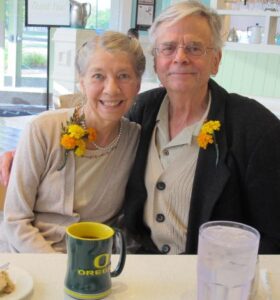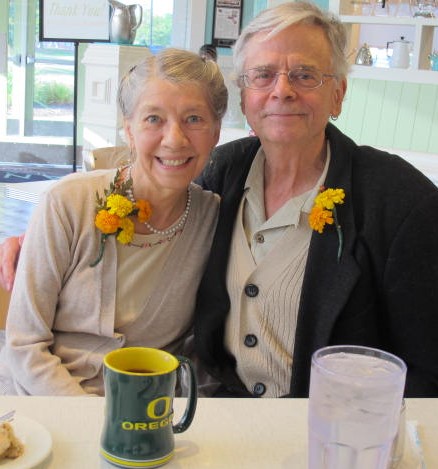
Never forget where you’ve come from. Don’t be afraid to acknowledge your class heritage to others throughout your life. If you try to forget your past, your present and future are incomplete.
Dwight Lang (Faculty)
Share Your Story
First gen journeys begin with family stories. My first gen story is no different.
My father was a coal miner in Roundup, Montana when I was born in 1950. Dad had left high school before graduating, while Mom was a 1945 Bismarck High School graduate. After marrying they moved west, finally settling in a small, working-class town north of Sacramento where Dad worked as a union plumber. He liked Rio Linda because residents were: “His kind of people.”
I started St. Patrick’s College in Mt. View, California (near San Jose) in September 1968. I was first in my family to attend college, but didn’t realize that by walking into college classrooms I was crossing social class boundaries. No one talked about this transition. In January 1970 I transferred to nearby and more costly Santa Clara University. My first-gen background differed from students whose fathers and mothers were college graduates. They had been raised in affluent suburbs, not California’s Rio Linda’s. I felt out of my league and wasn’t adjusting to college life.
Santa Clara’s tuition was expensive, so in January 1971 I transferred to Sacramento State College (Sac State) where I paid $80 per semester. I was on the same campus as Sylvia Wanner – a young first-gen woman also from Rio Linda. We had met on summer solstice 1969 and by 1970 had fallen in love. Sylvia’s dad was a skilled carpenter and her mom carefully tended their home hearth.
We married on September 11, 1971 when I was nearly 21 and Sylvia was still 19. Sac State was a more comfortable place where over half the students were first- gens. Sylvia earned her BA in sociology in 1974, while I graduated in 1972 with a degree in social welfare. I planned to be a social worker, but decided on another path. I wanted to do something that provided a better understanding of why poverty and class inequality existed and persisted. The usual explanation that poor and working-class people make bad decisions didn’t make sense or satisfy me.
Working While in College
While an undergraduate, I had a variety of blue-collar jobs mainly in the home construction industry. After my first year of college, I worked for a plumbing company digging ditches and delivering materials to work sites around the San Francisco Bay Area. During summers and falls of 1970 and 1971, in Sacramento, a business installing tile and counter tops in new homes employed me. My last blue-collar job was an apprentice plumber, which included attending night classes studying technical aspects of building construction. I learned a lot, but after being laid off in fall 1973 I needed to finally make a change.
My first white-collar job (summer 1974) was a Graduate Research Assistant at the California State Department of Education in Sacramento. Nearly 24 years old, I carried on my complicated transition to the middle class.
Our Journey Continues
In fall 1974 Sylvia and I started a master’s program in sociology at Sac State. We were excited to continue walking hand-in-hand across class boundaries. It wasn’t always easy, but we persisted. Our understanding of being “first-gen” and how we were different evolved.
We started a sociology PhD program at the University of Oregon in Eugene in Fall 1977. Fellow graduate students told stories about how their parents had post- graduate degrees and how they travelled nationally and internationally before attending college. Even so, all of us were now taking the same classes, even teaching our first courses while writing our dissertations. Social class differences didn’t disappear, but became less important in those Oregon years. Sylvia and I completed our PhD’s in 1983 and continued on to places far from Rio Linda.
My first academic position for Fall 1989 was at Madonna University in Livonia, Michigan. After retiring from Madonna (now Emeritus Professor there), I worked as a Lecturer in sociology here at Michigan from 2006 to 2020. I developed and taught a new course building on my academic interests: The Experience of Social Class in College and the Community. I helped establish and was faculty advisor to a new undergraduate organization: First Generation College Students@Michigan (FGCS@M) – initially sponsored in the sociology department and now located in the First-Generation Student Gateway.
In April 2009 and 2010 Sylvia and I hosted the first two first-gen graduations in our home. Since then, first-gen initiatives have grown and Michigan has realized a FGCS@M’s motto – The Three R’s – established by the undergraduate “founding five” during the 2007-08 academic year: Recognize, Raise Awareness of, and Resolve first generation student concerns.
Sylvia had a very productive career here at Michigan doing scientific research in the medical school and various institutes. She has always been an excellent role model for first-gens. We attend first-gen social events including fall and winter dinners, as well as annual first-gen graduations. We are comfortably retired and often think about our journey from Rio Linda to Ann Arbor – our fine place so far from home. My story would be different had I not met and married Sylvia. She supported me and our marriage making possible this (our) “first-gen story.”
Your advice for other First-Gen students
First, know that you deserve to attend Michigan and have the skills to achieve at the highest levels. You can realize your dreams as other students with very different backgrounds pursue their dreams too.
Second, take advantage of all learning opportunities. Attend concerts, lectures, movies, and departmental activities. Use your time to study the new world you will be part of.
Third, you are an accomplished boundary crosser and risk taker, so reach out to students who grew up in different circumstances. Learn their ways, norms, and values. Michigan enrolls students from across America’s economic spectrum and feeling comfortable with this diversity will benefit you.
Fourth, never be ashamed of your class heritage. A high percentage of Michigan students are born to significant economic privilege, but don’t let this intimidate you. All students take the same courses, walk the same campus sidewalks, and eat in the same cafeterias. Now is your opportunity to step up and show your family and others what you’re made of.
Fifth, remember a First Generation College Students@Michigan (FGCS@M) motto: We may be the first, but we won’t be the last. Be a role model for new, first-gens who might be feeling a bit insecure. Join organizations, like FGCS@M, that support students at this fine place so far from home.
Finally, and sixth: Never forget where you’ve come from. Don’t be afraid to acknowledge your class heritage to others throughout your life. If you try to forget your past, your present and future are incomplete.

